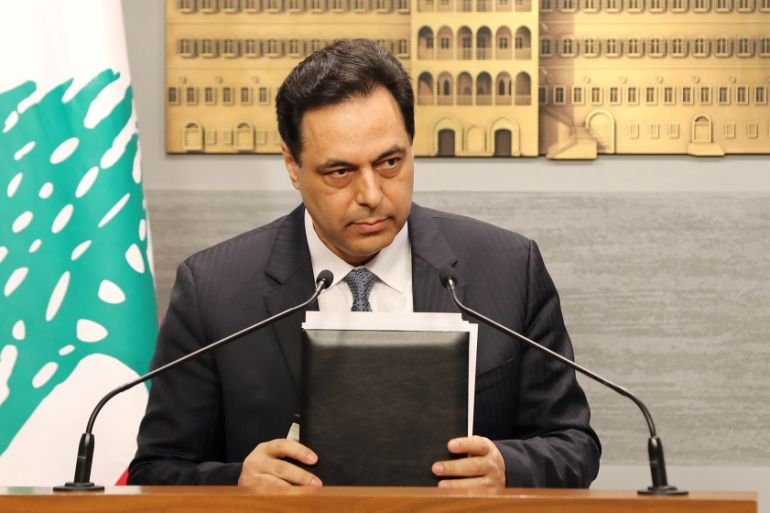Lebanon PM, former ministers charged over Beirut blast
Prime Minister Hassan Diab and three former ministers charged with negligence over Beirut port explosion.

Beirut, Lebanon – Lebanon’s outgoing Prime Minister Hassan Diab and three former ministers have been charged with negligence that led to the deaths of hundreds and injuries to thousands in the massive August Beirut port explosion.
Fadi Sawan, the judge investigating the blast, on Thursday charged Diab, former public works ministers Ghazi Zaeiter and Youssef Fenianos and former finance minister Ali Hassan Khalil, with criminal negligence, a senior judicial source told Al Jazeera. The charges were later confirmed by state media.
Keep reading
list of 3 items‘We lost everything’: Beirut explosion survivor
Beirut’s migrant workers persist in the shadow of the blast
Sawan said he would seek to question Diab as a defendant in the case on Monday at the Grand Serail, the seat of government in Beirut. He has also called in the former three ministers for questioning on Monday, Tuesday and Wednesday, also as defendants.
Sawan had previously questioned them only as “witnesses”.
But Diab’s office indicated the prime minister would not comply with Sawan’s investigation, saying in a statement that Sawan had violated the constitution by overstepping the role of the Parliament of Lebanon, which has a specialised court for the trial of top officials.
The prime minister’s “conscience is clear” and he had dealt with the explosion issue in a “responsible and transparent” manner, the statement said.
“This surprising targeting goes beyond the person to the position per se, and Hassan Diab will not allow the premiership to be targeted by any party,” the statement said.
Sawan’s decision comes two weeks after he sent a letter to Lebanon’s Parliament in which he noted “serious suspicions related to some government officials,” and their involvement in the explosion, according to a statement released on Thursday by a council of senior judges who appointed Sawan to probe the case.
Instead of initiating investigations at the specialised parliamentary court, Parliament’s office, under the control of Speaker Nabih Berri, replied two days later that it had “no suspicions” over the involvement of top officials in the blast based on the evidence Sawan presented in his letter.
The source told Al Jazeera that Sawan had tried to get Parliament “to explore the political responsibility of ministers, but they declined to move forward. This pushed him to file these charges of negligence, which he considers within his jurisdiction”.
The decision to prosecute the outgoing prime minister and former ministers is based on verified written correspondence sent to them, warning the officials about nearly 3,000 tonnes of explosive material at Beirut’s port, the source said.
Kayan Tlais, a spokesperson for a committee of the families of victims, told Al Jazeera that he had full confidence in the judiciary’s ability to prosecute the case and would leave it up to Sawan to determine who was ultimately responsible.
“We don’t want to pre-empt the trial or comment on who should be charged or not – that’s the expertise of the judiciary, not ours,” said Tlais, whose 39-year-old brother Mohammad, a foreman at the port’s container terminal, died in the explosion.
The latest charges raise the number of people being prosecuted over the blast to 37, some 25 of whom are in detention.
Ministers become defendants
The blast killed some 200 people, injured more than 6,000 and caused billions of dollars in damage to the capital. Diab’s government resigned in the wake of the explosion but has continued to function in a caretaker capacity since.
A relative political newcomer, Diab has said he initially learned of the presence of the explosive material on June 3, 2020.
But he said he waited until a report by the State Security agency on the matter was handed to him in late July before he took any action, which he said entailed informing relevant ministries to look into the matter.
Khalil and Zaieter are both veteran ministers with Berri’s Amal Movement, while Fenianos is a senior official in the Marada Movement of Christian leader Suleiman Frangieh.
They held office in the time after the explosive material entered Beirut’s port in late 2013 on board a cargo vessel.
Khalil served as finance minister from 2014 to 2020, during which time he nominally oversaw Lebanese Customs, whose head has been charged and detained in the case, along with a number of other officials.
Zaieter and Fenianos headed the public works ministry from 2014 to 2016 and 2016 to 2020 respectively.
The ministry is in charge of overseeing the port, and it’s director of Land and Maritime Transport, Abdel-Hafiz al-Kaissi, has been charged in the blast case.
Some families of blast victims – and some human rights groups, including Human Rights Watch and Amnesty International – have raised doubts about whether Sawan’s probe would lead to full accountability for victims, due to reported political interference and due process issues.
Thursday’s charges were welcomed by some, including Antonia Mulvey, the director of Legal Action Worldwide, which published a report last month that detailed evidence showing high-level officials knew of the explosives at the port but did nothing.
Mulvey in a tweet said that Thursday’s charges “could be a huge step forward in the investigation”.
Yet, other top officials who allegedly knew of the presence of the explosives at the port have not been charged – including President Michel Aoun, who received the same report that Diab received in late July.
Former Prime Minister Najib Mikati, who himself was caretaker prime minister when the ammonium nitrate entered the port, said there was a double standard in charging Diab over the blast when Aoun had seen the security report but has not been investigated.